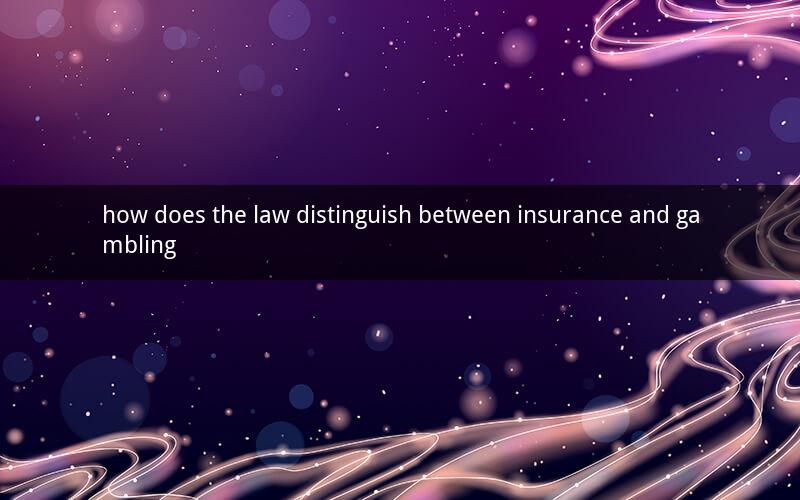
Table of Contents
1. Understanding Insurance
2. The Concept of Gambling
3. Legal Definitions and Distinctions
4. Risk Assessment in Insurance
5. The Role of Chance in Gambling
6. The Purpose of Insurance
7. The Motivation Behind Gambling
8. Insurance Contracts vs. Gambling Wagers
9. The Social and Economic Implications
10. The Role of Regulation
1. Understanding Insurance
Insurance is a contract between an individual or entity (the insured) and an insurance company (the insurer). The insured pays a premium in exchange for the insurer's promise to provide financial protection in the event of certain specified risks. These risks can include accidents, illnesses, property damage, and more.
2. The Concept of Gambling
Gambling, on the other hand, involves placing bets on an uncertain event with the hope of winning money or other prizes. It typically involves games of chance, such as lotteries, casinos, sports betting, and poker. Unlike insurance, the primary goal of gambling is to win money, rather than to protect against financial loss.
3. Legal Definitions and Distinctions
Legal systems around the world have established clear distinctions between insurance and gambling. Insurance is considered a legitimate business activity, while gambling is often regulated or prohibited. This distinction is based on several key factors:
- Purpose: Insurance is designed to provide financial protection against unforeseen events, while gambling is purely for entertainment or profit.
- Risk Assessment: Insurance involves the assessment of risk and the calculation of premiums based on the likelihood of a loss occurring. In gambling, the outcome is determined by chance.
- Contracts: Insurance contracts are legally binding agreements, while gambling wagers are typically informal and non-binding.
4. Risk Assessment in Insurance
Insurance companies use sophisticated risk assessment methods to determine the premiums they charge. They analyze historical data, statistical models, and other factors to estimate the likelihood of a claim being made. This ensures that the premiums paid by policyholders are sufficient to cover the expected claims and administrative costs.
5. The Role of Chance in Gambling
In gambling, the outcome is determined entirely by chance. This is in contrast to insurance, where the risk of loss is quantified and managed. While insurance companies can mitigate risk through diversification and reinsurance, the house always has an advantage in gambling.
6. The Purpose of Insurance
The primary purpose of insurance is to provide financial security and peace of mind. By transferring the risk of loss to an insurance company, individuals and businesses can protect themselves against unexpected events that could otherwise lead to financial hardship.
7. The Motivation Behind Gambling
Gamblers are motivated by a variety of factors, including the desire for excitement, the thrill of winning, and the potential for financial gain. While some gamblers may be responsible and enjoy gambling as a form of entertainment, others may develop gambling addictions that can have devastating consequences.
8. Insurance Contracts vs. Gambling Wagers
Insurance contracts are legally binding agreements that outline the terms and conditions of coverage. They typically require policyholders to pay premiums and comply with certain obligations, such as providing accurate information about their risk profile. In contrast, gambling wagers are often informal and do not involve a formal agreement between the parties involved.
9. The Social and Economic Implications
Insurance and gambling have significant social and economic implications. Insurance helps to reduce the financial burden of unexpected events, while gambling can lead to financial loss, addiction, and other negative consequences. The regulation of gambling is crucial to protect vulnerable individuals and ensure that the industry operates fairly and responsibly.
10. The Role of Regulation
Regulation plays a vital role in distinguishing between insurance and gambling. Governments around the world have implemented laws and regulations to ensure that insurance companies operate transparently and ethically, while also addressing the potential risks associated with gambling. These regulations help to protect consumers and maintain the integrity of the financial system.
Questions and Answers
1. What is the primary purpose of insurance?
- The primary purpose of insurance is to provide financial protection against unforeseen events.
2. How does insurance differ from gambling?
- Insurance is designed to provide financial protection against specific risks, while gambling involves placing bets on uncertain events for entertainment or profit.
3. What is the role of risk assessment in insurance?
- Risk assessment is crucial in insurance, as it helps determine the likelihood of a loss occurring and the appropriate premium to charge.
4. Why is gambling considered a riskier activity than insurance?
- Gambling involves placing bets on uncertain events, while insurance involves transferring the risk of loss to an insurance company.
5. What are the social implications of gambling?
- The social implications of gambling include financial loss, addiction, and other negative consequences for individuals and communities.
6. How do insurance companies calculate premiums?
- Insurance companies use risk assessment methods, such as analyzing historical data and statistical models, to calculate premiums.
7. What is the difference between an insurance contract and a gambling wager?
- Insurance contracts are legally binding agreements, while gambling wagers are typically informal and non-binding.
8. How do governments regulate the insurance industry?
- Governments regulate the insurance industry to ensure that companies operate transparently and ethically, while also protecting consumers.
9. What are the economic implications of insurance?
- The economic implications of insurance include reducing the financial burden of unexpected events and promoting financial stability.
10. How does the legal system distinguish between insurance and gambling?
- The legal system distinguishes between insurance and gambling based on factors such as purpose, risk assessment, and the nature of the contracts involved.